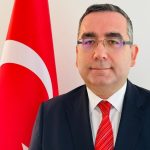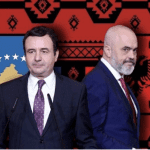By Jerina Zaloshnja
It is a beautiful, joyous day in Gjirokastra. October 30, 2024. The sun shines brightly in the warm, clear blue air. From the loudspeakers at the campus of UNED, Spain’s new university in the country, Spanish music reverberates slowly. Young students dressed in traditional Gjirokastra costumes offer grape raki and Gjirokastrite specialties – delicious thin pancakes – to all those attending. The atmosphere is festive. The grounds near the high school are filled with locals, students from “Eqerem Çabej” University, city officials, the Spanish Ambassador to Albania Álvaro Renedo Zalba, two special guests from Spain – UNED Rector Ricardo Mairal Uson and Vice-Rector Professor Laura Alba-Juez, Mayor Flamur Golemi, guests from Tirana, journalists, and TV cameras guided by veteran reporter Engjëll Serjani. It’s a full and sincere celebration for Gjirokastra.
From today, a European institution, Spain’s UNED University, will have a new campus in Gjirokastra.
With over 200,000 students from more than 100 nationalities, UNED is Spain’s largest public university and one of Europe’s biggest campuses. It’s a prestigious institution, recognized both nationally and internationally, and a pioneer in long-distance education since the early 1970s. The campus inaugurated today in Albania is UNED’s 24th outside Spain and its first in the Balkans.
According to Álvaro Renedo Zalba, many doors are opening today. UNED’s campus offers a wide array of programs recognized internationally as part of the EU’s Higher Education Area, representing crucial opportunities: 30 Bachelor’s programs, 78 Master’s programs, 21 Ph.D. programs, 27 micro-degrees, 16 language courses, over 500 continuing education programs, and more than 1,000 open courses.
Albert R. and I arrived early at the ceremony because Erion M., the owner of the “N’Sokak” Hotel, kindly drove us to avoid the hundred-meter walk down “Sokaku i të Marrëve” (the street of the Mad), where the spirit of world-renowned writer Ismail Kadare seems to linger still.
As we near the festivities, the Democratic Party’s local office , the opposition building appears before us. “That place is for rent now,” says Erion M., as if referring to something that is not needed anymore. I think this might be the hotel owner’s idea of a joke, because I think he also knows that without opposition, there is no pluralism, and without pluralism, there is no freedom. I think of saying this out loud, but I stop myself. I don’t know why I was reminded of a peculiar character of Kadare: Llukan Burgamadhi, who found himself happy only when imprisoned. His cause for protest was borne of the prisons being opened, because now he had to leave. Although more than thirty years have passed, the nostalgia for collective imprisonment is still alive and well in this country. Even 30 years after the fall of communism, pluralism and democracy still doesn’t quite fit.
“We should have walked down the The street of the Mad,” Albert R. muses, talking to himself more than anything.
“The Street of the Mad” – The Path to Europe?
To reach UNED University’s new campus in Gjirokastra, one must pass through the “Alley of the Mad.” Fifty meters further on is the home of the famous writer. Once, before the 1990s, through one of Albanian literature’s most extraordinary novels, Chronicle in Stone, which Kadare dedicated to his birthplace Gjirokastra, Albania “traveled” to Europe through the “Alley of the Mad” mentioned in its pages. As paradoxical as it may sound, this occurred while Albania was completely isolated from Europe and the world. It may sound absurd: How could Albania travel to Europe through a novel when no one was allowed to leave the communist bunker and when “The Alley of the Mad” was merely a tiny street in the southern city of Gjirokastra? But it happened. “The Street of the Mad,” one of the surrealist scenes in Chronicle in Stone, allowed Gjirokastra and Albania to introduce themselves to Europe. It’s a metaphor, of course, but also a reality. Chronicle in Stone became Europe’s only window into Albania, the world’s most isolated country at that time,” says Albert R.
Thirty years after the fall of communism and the end of isolation, “The Alley of the Mad” still leads to… Europe. After you pass those fifty or sixty steps along “The Street of the Mad,” you stand before the newest European campus in Gjirokastra. UNED, one of Spain’s oldest and most prominent public universities. Following the opening of the College of Europe, which welcomed its first students last month, UNED marks yet another education milestone for Albania, this time coming from Spain.
The UNED Campus in Gjirokastra “Is Built with Love”
The inauguration of the campus, scheduled to start at 9:00 a.m., is delayed by an hour as we await officials from Tirana. The night before, UNED Rector Ricardo Mairal Uson, Vice-Rector Laura Alba-Juez, the Spanish Ambassador to Albania, and his wife Mercedes – who seems most moved – arrived in Gjirokastra, along with Erjola Braha, who, through her “Alejandro” wine enterprise, brings Europe to Albania daily, and other friends, including myself and Albert R..
The previous night’s dinner was lively and festive. Perhaps that’s why I misunderstood Mercedes, the ambassador’s wife, when I asked about their three children and thought she was referring to a fourth.
“Oh my!” I exclaimed, well aware of the challenges of raising children.
“Yes, there are four,” Mercedes laughed. “The fourth is UNED’s campus in Gjirokastra.”
“Álvaro sees this university in Gjirokastra as his own child,” she confirmed, a lawyer by profession.
The establishment of UNED University in Gjirokastra is a long process, filled with love. During the ceremony, the Spanish ambassador, emotional in his remarks, stated, “UNED’s campus in Gjirokastra is possibly the most important initiative I have pursued as Ambassador to Albania. I see it almost as a fourth child. This time, born in Gjirokastra. So now, I have a ‘Tirons’ and a ‘Gjirokastrit’ in the family! An honor and privilege forever engraved in my heart.”
“This wonderful and important idea would not have been made possible without Ambassador Alvaro Renedo Zalba,” says Albert R. “It is one of those rare cases when a talented diplomat is also an academic.”
“Our heartfelt thanks go to Ambassador Álvaro Renedo,” echoed UNED Rector Mairal Uson, “for
he has been the keystone in this magnificent project. Without his perseverance, his enthusiasm and his hard work nothing of this would have been possible. He is really an example of serious and committed person to all of us, always willing to work to make this world a better place to live in.
“From an academic perspective, I feel equally satisfied”- says Alvaro Renedo Zalba.
“I have always believed that education is one of the most -if not the most- important policy fields. And UNED is my alma mater: I received my PhD by this university, based on a research project I undertook at Harvard University. UNED was the first university in Spain associated to the European Union’s Doctoral School on CSDP, my PhD was the first in history to be defended within EU institutions. Hand and in hand with UNED, in the European External Action Service, in Brussels. As of today, Albanians will have access to these important opportunities afforded by UNED, which I have greatly benefitted from”.
A European Academic Hub in the Western Balkans
The arrival of a prestigious European university campus in Gjirokastra is also a testament to vision.
For Ambassador Álvaro Renedo, “UNED’s campus in Gjirokastra is a milestone in the relationship between Spain and Albania, marking an exciting new chapter for higher education in Albania.”
“The arrival of UNED University in Gjirokastër is a strategic investment in the field of education,” says Albert R. After the College of Europe in Tirana—for which he has an almost parental affection and approach—the UNED University Campus in Gjirokastër is another important step that ties Albania with Europe, with the West.”
From a diplomatic perspective”- ambassador Alvaro Renaldo Zalba notes – “I would like to underscore the geostrategic significance of the disembarkment of UNED in Albania. The inauguration of the Gjirokastër campus highlights, in my view, three crucial elements, closely interrelated:
FIRST -Albania’s condition as an academic hub in the Western Balkans. UNED and the College of Europe are the first EU higher education institutions which establish a permanent campus in Albania. Thus, UNED is a bridge not only between Albania and Spain, but also between Albania and Europe as a whole.
SECOND -Albania’s popularity and influence, which lie at the heart of what political scientists designate “soft power”. I am firmly convinced that Albania has ever growing “soft power”, which is crucial for winning hearts and minds all over the world. This bears particular significance for diplomacy -and EU integration.
THIRD -The extraordinary talent of Albanian people. What Ismail Kadaré qualified as “the immense human energy present in Albania”. This has also been a crucial factor for UNED’s decision to open a campus in Albania. As I see it, talent is perhaps the greatest treasure in this wonderful country, and one of the most important sources of strategic added value that Albania is bringing to Europe.
The mayor of Gjirokastra, Flamur Golemi, as well has contributed to the university campus’s establishment.
“This campus will benefit the city and wasn’t chosen at random. This year, over 150,000 Spanish tourists visited Gjirokastra,” the mayor noted.
Merita Isaraj, Vice-Rector of “Eqerem Çabej” Public University in Gjirokastra, is excited about this significant development for the city.
“There’s no reason for envy,” she says, a sentiment shared by Prof. Dr. Jaho Cana, the local Public university’s rector.
UNED’s campus in Gjirokastra will not serve only Albanian students.
“The Gjirokastra campus will be a European Hub of excellence for the Western Balkans, and beyond, for students from the Mediterranean or European countries,” states Vice-Rector Laura Alba-Juez, one of the key figures in makings of this project.
Closing Remarks
With all the speeches concluded, the young students in traditional costumes again offer the traditional thin pancakes and raki in tiny glasses.
Finally, everyone gathers for the official photo: a few officials from Tirana, Gjirokastra’s mayor, the prefect, the university rector, the Spanish Ambassador Álvaro Renedo Zalba, his wife Mercedes, UNED’s Rector Mairal Uson, and Vice-Rector Laura Alba-Juez.
“You were right,” Albert R. tells me. “Kadare’s spirit roams this city. That’s good for everyone, even for the new university.”













